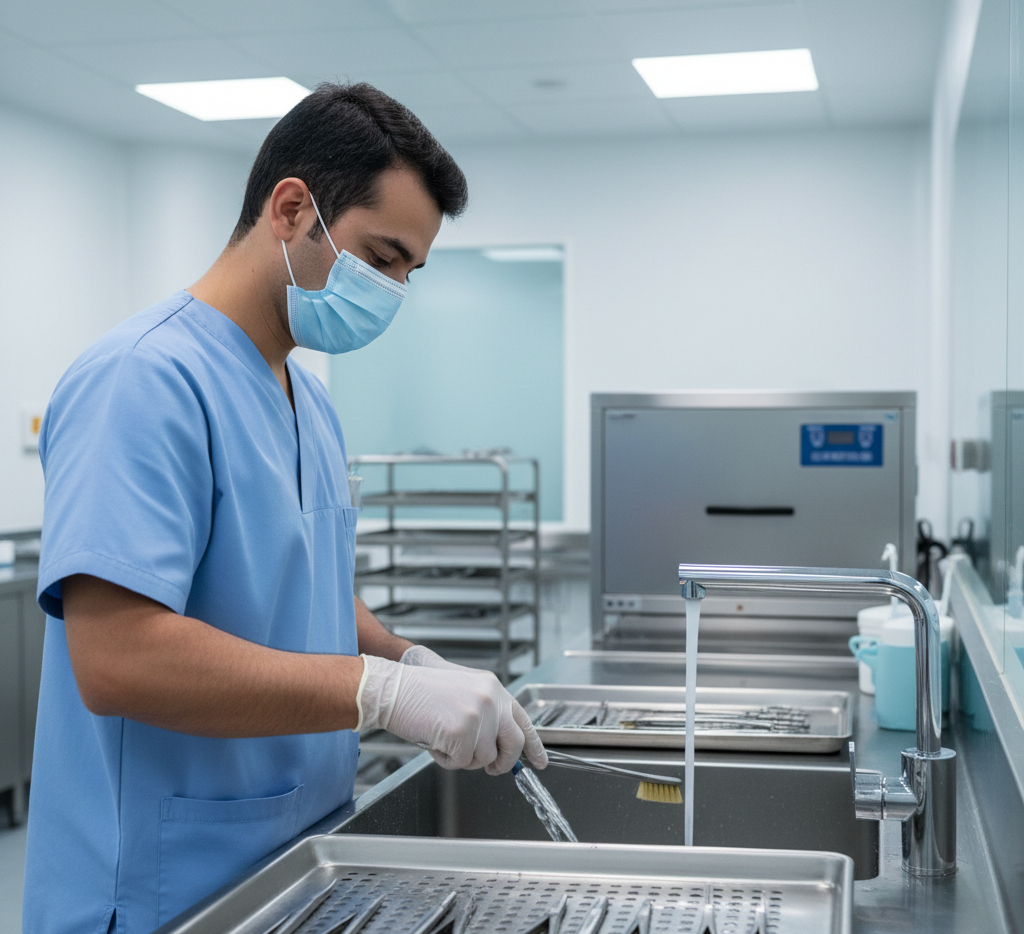Meta Description
The person who cleans surgical instruments plays a vital role in hospital infection control. Learn their duties, training requirements, job title, responsibilities, and career scope in sterile processing and CSSD.
Introduction
Inside every hospital or surgical center, there is a person responsible for cleaning, disinfecting, and sterilizing surgical instruments. Most people only see surgeons and nurses inside an operation theatre, but behind the scenes, trained professionals are working daily to ensure every tool is safe, sterile, and ready for surgery.
This professional is known as a Sterile Processing Technician, Central Sterile Technician, or CSSD Technician. These are the unsung heroes of infection control who prevent contamination, surgical site infections, and cross-transmission of diseases.
The cleaning of surgical instruments is not a simple job — it requires:
- Deep knowledge of microbiology,
- Understanding of sterilization methods,
- Skill in handling delicate and expensive instruments,
- High responsibility for patient safety.
What is the Job Title of a Person Who Cleans Surgical Instruments?
The official job titles include:
| Job Title | Description |
|---|---|
| Sterile Processing Technician | Cleans, disinfects, and sterilizes surgical tools |
| CSSD Technician | Works in Central Sterile Services Department |
| Instrument Technician | Specializes in handling and preparing instruments |
| Reprocessing Technician | Responsible for cleaning and reassembling sets |
In some hospitals, they are also called:
- Central Supply Technician
- Sterilization Technician
- Medical Device Reprocessor
Role and Importance in the Hospital
The person who cleans surgical instruments plays a life-saving role in healthcare. Without their work, surgery cannot begin safely.
Why Their Job is Critical
| Reason | Impact |
|---|---|
| Infection Prevention | Reduces risk of surgical site infections |
| Patient Safety | Ensures sterile tools are used each time |
| Instrument Longevity | Protects tools from corrosion & damage |
| Operating Room Efficiency | Makes surgery sets ready on time |
If they fail to clean properly, sterilization becomes useless since blood and organic debris can shield bacteria, leading to dangerous infections.
Duties & Responsibilities
The responsibilities of the person who cleans surgical instruments go far beyond simple washing. Their duties include:
1. Point-of-Use Pre-Cleaning
Removing visible contamination before drying.
2. Sorting and Disassembling
Separating delicate instruments and opening hinges.
3. Manual Cleaning
Using soft brushes and neutral pH detergents.
4. Ultrasonic Cleaning
Removing microscopic debris from serrations.
5. High-Level Disinfection
Killing microorganisms before sterilization.
6. Inspection & Testing
Checking for cracks, rust, sharpness, and alignment.
7. Packing and Tray Assembly
Arranging sets according to surgical procedure.
8. Sterilization Operation
Operating autoclaves or plasma sterilizers.
9. Documentation
Maintaining records of sterilization cycles.
10. Delivery to OT
Providing sterile sets to the operating theatre.
Skills Required
| Skill | Why Important |
|---|---|
| Attention to Detail | Microscopic residue can cause infection |
| Technical Knowledge | Sterilization equipment handling |
| Hygiene Awareness | Infection control protocols |
| Time Management | OR schedule depends on them |
| Instrument Familiarity | Different sets for different surgeries |
Training & Certification
A person who cleans surgical instruments can become certified through:
| Country/Region | Certification | Description |
|---|---|---|
| USA | CRCST | Certified Registered Central Service Technician |
| UK | NVQ Sterile Services | Hospital sterilization training |
| Canada | CMDRT | Medical Device Reprocessing |
| UAE / Gulf | MOH / DHA Courses | Hospital sterile technician approval |
| South Asia | CSSD Training | Hospital-based training programs |
Most technicians receive both theoretical training and hands-on cleaning practice in hospital CSSD departments.
Work Environment
They usually work in:
- Hospitals
- Surgical centers
- Dental hospitals
- Eye care centers
- Plastic / orthopedic hospitals
- Medical device reprocessing units
The department where they work is called Central Sterile Services Department (CSSD).
Tools & Equipment Used
| Equipment | Purpose |
|---|---|
| Ultrasonic Cleaner | Deep cleaning |
| Washer-Disinfector | Automated washing |
| Autoclave | Steam sterilization |
| Heat Sealers | Packaging |
| Inspection Light | Fine examination |
Salary & Career Growth
| Country | Average Salary |
|---|---|
| USA | $35,000 – $55,000 annually |
| UK | £20,000 – £28,000 |
| UAE/Gulf | 2500 – 4500 AED |
| Pakistan/India | 25,000 – 60,000 PKR monthly |
With experience and further training, a technician can progress to:
- Senior CSSD Technician
- CSSD Supervisor
- Sterilization Manager
- Quality Control Specialist
- Infection Control Officer
SEO Keywords Covered
✅ person who cleans surgical instruments
✅ sterile processing technician
✅ CSSD technician duties
✅ job role of instrument cleaner
✅ surgical instrument reprocessing
✅ sterilization professional role
✅ hospital infection control staff
Conclusion
The person who cleans surgical instruments plays a silent yet life-saving role in every hospital. Their job ensures that every surgical tool is sterile, safe, and infection-free before it reaches the surgeon’s hands. With growing demand for surgeries and improved healthcare standards, the role of sterile processing technicians and CSSD staff is becoming more essential and globally recognized.

